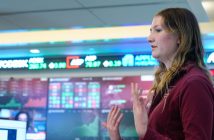Two years ago, the Business Roundtable, a group of chief executive officers from America’s leading companies, declared that corporations should promote an economy that serves all Americans, not just wealthy investors. Through a month-long virtual conference co-hosted by Fordham Law’s Institute on Religion, Law, and Lawyer’s Work, experts are exploring how businesses can accomplish this goal using an approach inspired by the Catholic Church.
“[The U.S. economy has] just become horribly unequal, unfair … and marked by a lot of selfishness and greed,” said Jeffrey Sachs, Ph.D., a well-known Columbia University economist focused on sustainability, at the first conference session on Oct. 5. “We need a guiding hand of values … And we’ve lost that a little bit in the United States over [the past few]decades.”
The conference is centered around the Economy of Communion, a global movement inspired by the Roman Catholic Church that seeks to have people live and work in an integrated way, overcoming the gap between rich and poor by using business profits for the greater good. In an hour-long Zoom conversation, Sachs and fellow scholar Luigino Bruni, Ph.D., professor of economics at the Lumsa University in Rome and editor-in-chief of the International Review of Economics journal, discussed how U.S. businesses can spur social healing with the Economy of Communion as a guiding principle.
For decades, the U.S. market has been steadily putting wealth into the pockets of the top 1%, including entrepreneurs like Facebook co-founder Mark Zuckerberg and Amazon founder Jeff Bezos, said Sachs. The market has become unequal for many reasons, such as monopolization and the evolution of technology, which favors people with higher education and skills.
To help combat the wealth gap, business leaders should ask themselves four key questions, said Sachs: Are their products unhealthy and/or addictive? Are their goods and services produced in a sustainable manner? Is their supply chain ethically and ecologically sound? Does their company pay their taxes?
Sachs said that business leaders, especially those whose companies are doing financially well, should also accept higher corporation taxes that can provide basic resources for the poor.
“This is the basic principle of the church, the universal destination of goods, that the Earth belongs to everybody, not just to the rich,” Sachs said. “That’s the Economy of Communion—that we understand that our community, which is very rich right now, is for everybody. And we shouldn’t stand in the way of ensuring that everybody can benefit. It is not an economy that’s made for a few multi gazillionaires to have all the wealth at the top and the rest of the people to be struggling.”
This economic model is not socialism, said Bruni.
“The Bible is very clear that all wealth belongs to God, and we are just managers, administrators of the common good,” Bruni said.
The Economy of Communion was born in the Catholic tradition, but it is also a universal idea that can resonate with other faiths, said Bruni. He cited two iconic figures—Gandhi and Martin Luther King, Jr.—who had an immeasurable impact on millions of people across the world. Even though they had different identities, what bonded them was their universal message and way of understanding life, he said.
“The economy is a basis for very rich dialogue. It’s a matter of life, it’s a matter of everyday things,” Bruni said. “It’s a beautiful place for deep, interreligious and intercultural dialogue.”
The conference “The Economy of Communion as Stakeholder Capitalism: Exploring Religion’s Evolving Influence on Business” is co-hosted by the Fordham School of Law and the Tanenbaum Center for Interreligious Understanding. The month-long event will feature three more one-hour sessions each Tuesday, as well as two Thursday sessions for reflection and networking. The full schedule can be viewed here.



